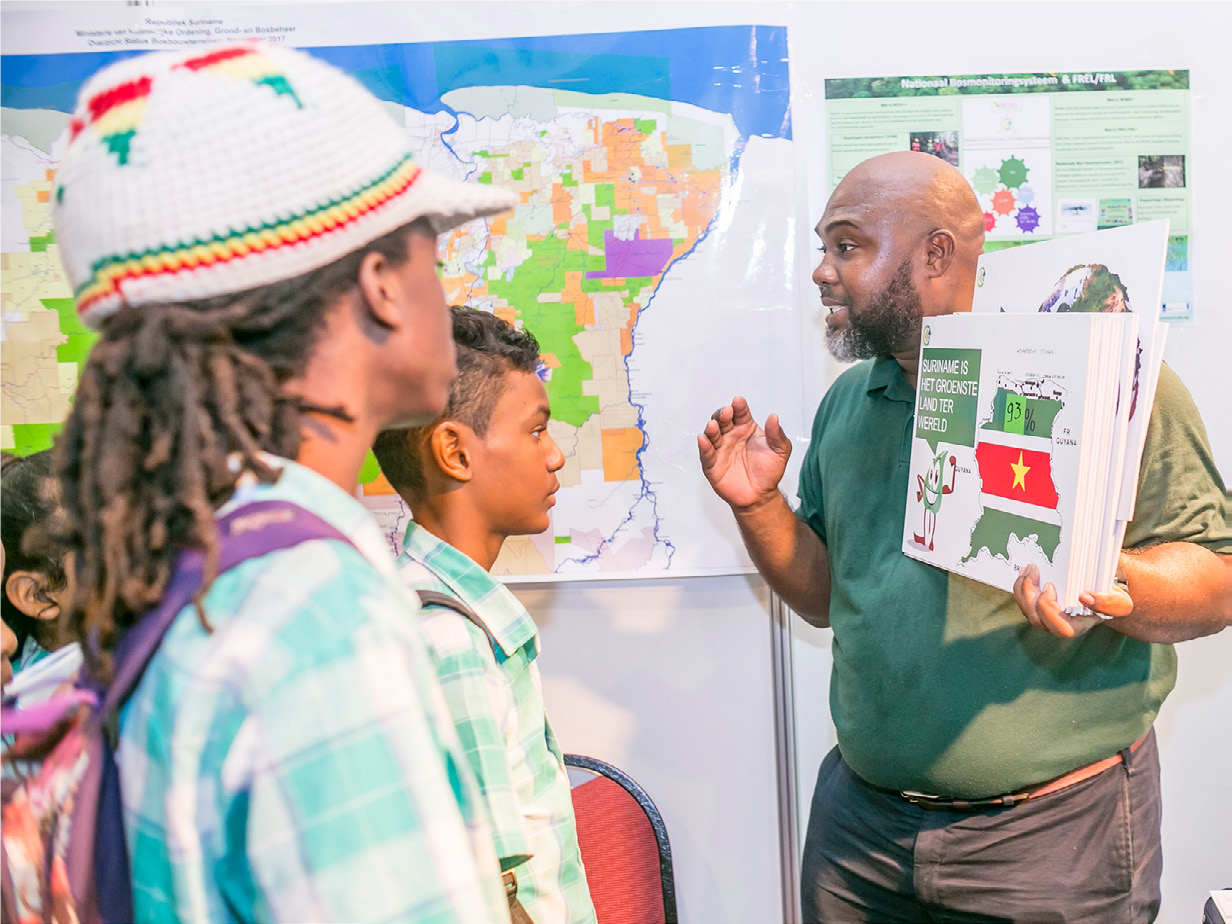Suriname’s Community-Based Communication Initiatives

Introduction
The UN Development Programme’s Japan-Caribbean Climate Change Partnership (UNDP J-CCCP) is an initiative designed to strengthen the capacity of countries in the Caribbean to invest in climate change mitigation and adaptation. The Caribbean is particularly vulnerable to the impacts of climate change and this partnership seeks to develop projects and campaigns to educate, inform, and create opportunities for climate change awareness.
As part of this partnership, J-CCCP designed and facilitated a communications campaign* based on the results of a Knowledge, Attitudes, Practices and Behaviour (KAP/B) survey carried out in two selected Suriname districts: Marowijne and Commewijne. The low population density combined with the impressive diversity and large land mass, relative to other Caribbean territories, of Suriname made it challenging to sample the entire population. These communities were selected to ensure that the sample would be representative of the great diversity in Suriname as both districts had very distinct characteristics. The survey formed the base for the communication strategy, to determine what people know, feel and do in relation to the climate they live in and what changes they perceive.
*Access the full case study from the right-hand column.
Methods and Tools: Storytelling Workshops
The KAP/B survey informed the decision to develop an aspect of the communication campaign based on storytelling.
- Traditional media channels were recorded as the main source of information, however because rural areas did not consistently receive television and radio programming additional points of communication that took into account their belief systems, language skills and entertainment preferences were recommended.
- The storytelling workshops were organised where artists, educators, local authorities and local media gathered to learn about the effects of climate change and were encouraged to have open discussions amongst themselves about sustainable development and other applicable issues.
During the workshop, an animation was created with a Dutch voiceover which assisted in outlining the climate change concerns faced by Suriname.
- The animation acted as a learning tool and later, was used to launch the campaign along with the storytellers.
During the workshop, the stories were presented, refined and finally some were selected for recording and distribution via traditional media, which still leads as a source of information, according to the KAP/B results.
- The stories were also used at ‘live’ performances, public hearings and other social gatherings.
- It is important to note that prior to broadcast, the animation and the stories were pre-tested using focus groups in local communities and revised as necessary, to ensure that the message was understood and could easily be adopted.
Lessons Learnt
Development of Programmes which Reflect Suriname’s Diversity
- Due to Suriname’s diverse population and variation in languages spoken, a one-size fits all approach from the top-down would not effectively address the target audience.
- As such, it was prudent to ensure that all communication materials resonated more closely with them so they would be easily shareable.
- Hence the decision to have community leaders and artists create their own unique materials.
User Generated Content
- User Generated Content is defined as any type of content that has been created and distributed by unpaid contributors.
- The storytelling workshop and resulting deliverables was a smart and effective way of helping to bridge the gap for Surinamese who are aware of climate change but not necessarily clear on how it directly impacts them.
Brand Ambassadors and Community Links
- Resulting from these workshops, the initiative got immediate brand ambassadors, in the form of the workshop participants.
- The participatory approach ensured buy-in from storytellers who were engaged and willing to write, adjust and create content for climate change awareness.
- This means that the storytelling workshop’s success was two-fold:
- development of effective, shareable materials as well as;
- “partners” who can champion the cause of climate change awareness.
Suggested citation
UNDP J-CCCP, 2019. Case study: Suriname’s Community-Based Communication Initiatives. UNDP.
Further reading
- The IPCC’s Fifth Assessment Report: What’s in it for Latin America
- The IPCC’s 1.5°C Report – What are the implications for development choices in Latin America?
- Our Valuable Voices: Community Digital Storytelling for Good Programming and Policy Engagement
- Stakeholder engagement, dialogue and modes of learning
(0) Comments
There is no content